If you’re looking for realistic ways to make money online, copywriting represents an excellent side hustle for the people willing to put in the work.
For others, it can be a rewarding, full-time career with the opportunity to make as much as a six-figure salary and even millions of dollars! However, getting rich as a copywriter is an exception, not the rule.
If you are thinking about how to become a copywriter, the first thing you need to know is that copywriting doesn’t always offer the opportunity to make fast, easy money.
In fact, it can take years of hard work, mastering the craft, and building a solid reputation, if you want to become a successful copywriter.
But it all depends on the person and the type of work. In this article, we’ll outline how to be a copywriter in an achievable and realistic way.
- What is a Copywriter?
- Is Copywriting a Legitimate Way to Make Money?
- How to Start as a Copywriter: Breaking Into the Field
- Do You Need Any Special Skills to Become a Copywriter?
- How to Become a Successful Copywriter
- How Much Do Copywriters Get Paid?
- Step-by-Step Guide to Become a Copywriter
- How to Scale Your Copywriting Job: From Side Hustle to Full-Time
What is a Copywriter?
A copywriter is someone who writes copy for advertising and marketing materials (both digital and physical). Copywriters are responsible for crafting the language in blog posts, landing pages, Facebook ad copy, and so much more.

What is the Difference Between Copywriting and Other Types of Writing?
When it comes to copywriting, there is a lot that goes into it that other types of writing simply don’t have.
Perhaps the biggest difference between copywriting and other types of writing is that copywriting is all about persuasion. You are trying to get the reader to do something, whether that be to buy a product, sign up for a service, or anything else. Other types of writing may have persuasive elements, but persuasion is not the focus.
Another key difference is that good copywriting is all about brevity.
You want to get your point across as quickly and efficiently as possible. This means using active voice and short sentences. Other types of writing can be more flowery and descriptive, but when it comes to copywriting, less is almost always more.
Finally, copywriting must be effective in order to convert. A successful copywriter must be able to understand the needs and wants of their target audience and then craft persuasive language that convinces them to take action.
Copywriters typically have a background in advertising, marketing, English, or communications. Many copywriters have a bachelor’s degree, but it’s not required. The best way to learn copywriting is through practice and experience.
Are Copywriters Ghostwriters?
While not all ghostwriters are copywriters, in most cases copywriters are ghostwriters. This means the copy that they write typically doesn’t have a byline. In other words, they don’t get credit as an author.
The sometimes exception here is for writing blog posts. In that case, they might receive the credit. It all depends on the nature of the content they are creating, and who they are writing it for.
The good news is, you may be able to use your copywriting samples in your portfolio more freely than you would if you’re a ghostwriter.
Ghostwriters often have to deal with pesky rules like signing nondisclosure agreements that basically swear these writers to secrecy about the stuff they are writing.
Copywriters, on the other hand, don’t necessarily have those rules attached to the content they develop. But, they might!
Is Copywriting a Legitimate Way to Make Money?
Yes! Copywriting represents an excellent side hustle, or even a part-time gig, for the people willing to put in the work.
For those who take even more time to hone in on the craft, and practice getting so good at it that they could sell sand in the desert or ice in an igloo, copywriting can be a rewarding, full-time career.
With enough skill and reputation, you could make as much as a six-figure salary and even millions of dollars! However, we should get this out of the way right now: Getting wildly rich as a copywriter is an exception, not the rule.
Can You Work From Home as a Copywriter?
Yes, you can work from home as a copywriter! That is what draws a lot of people to the field – copywriting can be done anywhere with an internet connection. Other perks of being a copywriter include, but aren’t limited to:
- Being able to build a business solely out of your writing skills
- Working in a fast-paced environment where two days in a row are rarely similar
- In-depth research opportunities that let you explore subjects in a way you likely never have before
- The ability to convey a message about products and services to help business owners sell more products and customers solve their deepest pain points
- Literally having a job where you can change lives
Can You Work Full-Time as a Copywriter?
You totally can! The great thing about copywriting is that it will always be in demand. In fact, as the world increasingly moves online, the demand for copywriters will only continue to grow.
After all, someone has to write all those website descriptions, social media posts, and email newsletters. And who better to do it than you?
Sure, anyone can string together a few sentences. But it takes a special skill to be able to capture a brand’s voice and communicate its message in a way that resonates with customers.
That’s why businesses will always need copywriters. In fact, you might even find yourself in high demand which can translate to higher paychecks.
How to Start as a Copywriter: Breaking Into the Field
At the risk of sounding overly simplistic, the key to breaking into the field of copywriting is to start writing. Here’s the Reader’s Digest version of how to become a copywriter:
- Start writing copy – either for your own website or for someone else.
- Take classes, read books, and listen to podcasts on the subject of copywriting. For some people, copywriting will come naturally, and this might not take as much effort as it will for others.
- Get really good at one or two types of copy.
- Start pitching your services and put yourself out there as a copywriter for hire.
- Use those initial writing assignments to develop social proof that you are good at what you do.
- Keep signing up for more gigs, and continue building your skill set.
- Scale up, and build a lucrative career either as an agency owner or in-demand freelancer/staff member.
Still here? Awesome! Let’s dive deeper!
You might be wondering: What do copywriters write? And, are there different types of copywriters?
Let’s explore the answers to those questions next.
What Do Copywriters Write?
Copywriters write a wide range of copy that includes, but is far from limited to:
- Facebook ads/Google ads: This is the copy you will see trying to encourage you to buy a product now or opt-in to a newsletter. All those ads on the sidebar of a web page, or even on your Facebook feed – a copywriter created all that juicy writing in the hopes you will see that sponsored message and act.
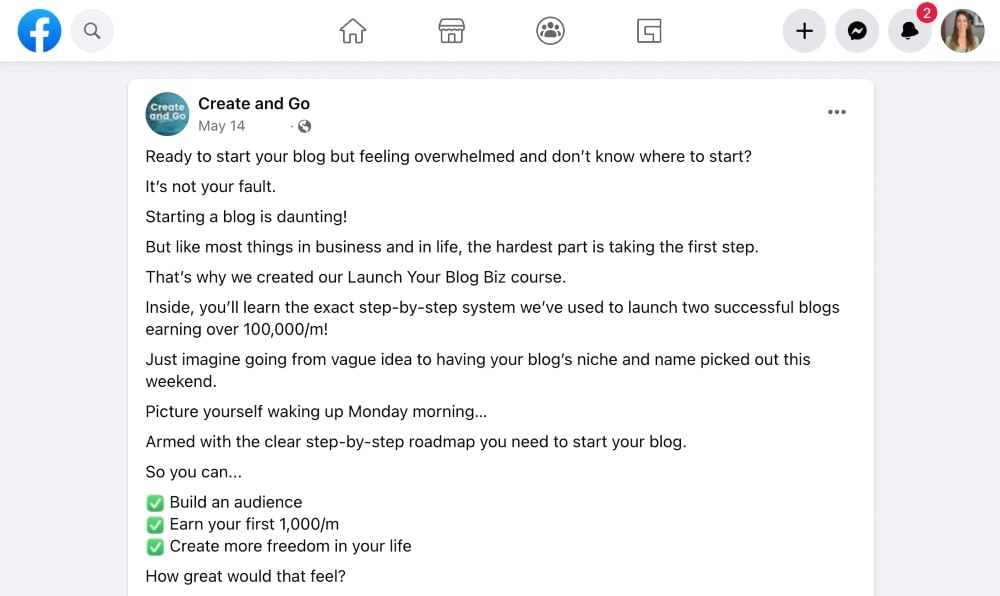
- Landing pages/Web pages: These are the pages that dive deeper into the products and services a business is trying to sell. A copywriter will explore all aspects of the subject, and write compelling copy that convinces you of all the reasons you need that widget or service and why the price is a steal.
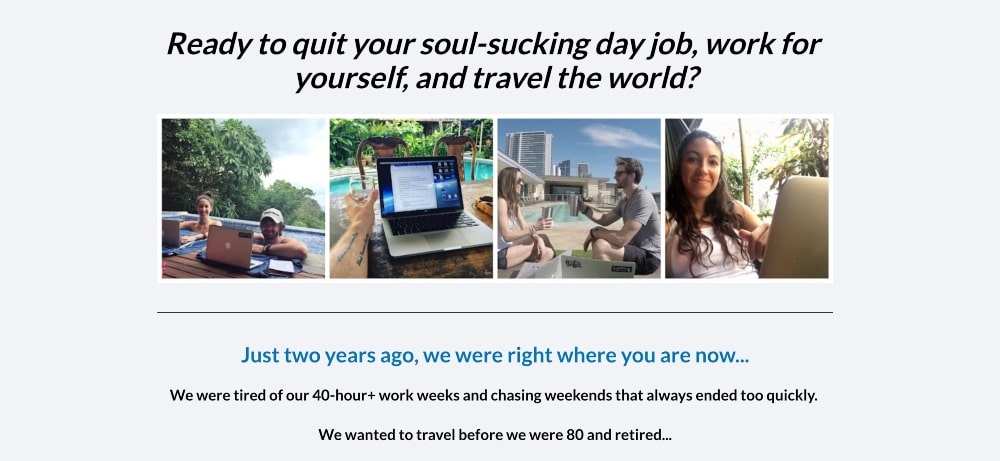
- Blog posts: A blog post is an article written by a blogger on their website or on someone else’s. Blog posts are usually about topics that the blog’s owner is passionate about, and can range from personal thoughts to current news events. Blog posts often include pictures and links to other websites.
- White papers: A white paper is a persuasive, authoritative, in-depth report on a specific topic that presents a problem and provides a solution. White papers are used to educate readers and help them make informed decisions about complex issues. Copywriters use white papers to establish themselves as experts in their field and to demonstrate their knowledge of the latest trends and research.
- Emails and sales letters: These are the pieces of correspondence that drop in your inbox or even your mailbox that are crafted in a way that is intended to make you feel like the copywriter is speaking directly to you. When done correctly, it will seem as though the author is reading your mind and telling you everything you need to hear.
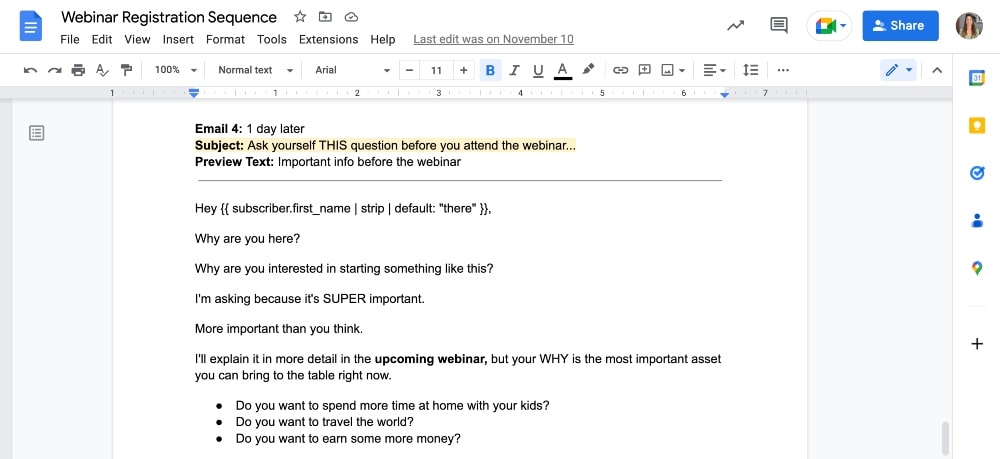
- Product description pages/App homepages: The goal of these pages is to tell you all of the specs and features of the product or app and why you need it in your life.
- Video scripts for webinars, ads, YouTube, and more: Yep, copywriters write these too! These video scripts are crafted to convert. These videos are often referred to as a video sales letter (VSL), and the copywriter crafting the script will use the same principles used in sales letter copywriting but applied to a video format.
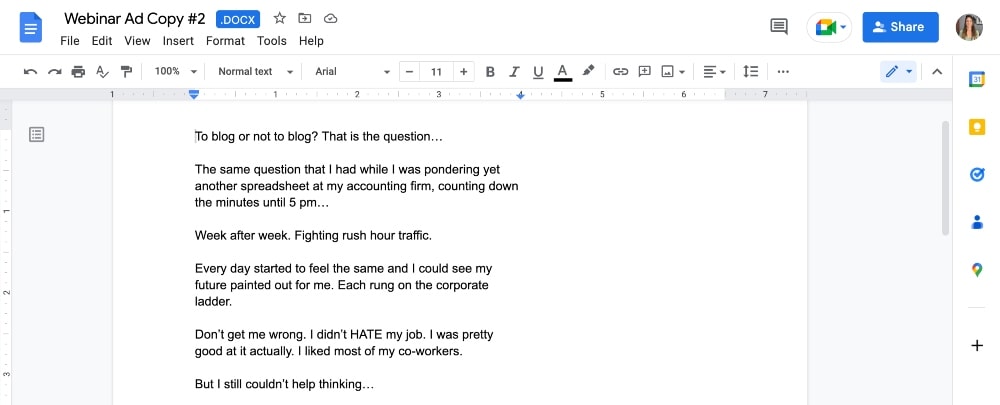
Again, this is far from an exhaustive list. It’s also important to note that one copywriter is rarely responsible for writing all of these pieces – unless you’re the owner of the business and responsible for every aspect of your business.
For example, it’s not uncommon for a blogger hoping to create a blog-based business to take on all of these copywriting roles at the beginning of running their website.
But as you grow and scale your business, you will likely begin hiring out most of the writing so you can focus on other aspects of running a business.
That is of course you really love writing copy, then you might hire out other tasks. But, there will come a point where you can’t write all the copy you are hired to write because there are only so many hours in the day. When you hit that cap, you’re limited to three choices:
- Hiring additional writers to increase your annual revenue
- Raising your rates significantly due to the demand on your time, or
- Settling for the amount of money you can earn doing it all yourself in any given year
The Two Types of Copywriters
Typically, there are two categories of copy:
- Direct response copywriting: This type of copywriting involves writing copy that aims at getting the reader to take immediate action such as giving an email address to receive a lead magnet or clicking through a sales letter to visit a product description page.
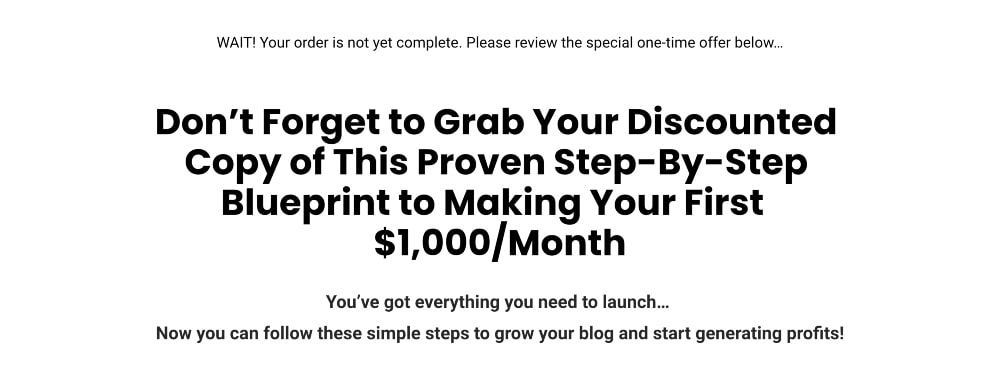
- Branding copywriting: Branding copy is written to elicit trust or memorability in the reader connected to a specific subject, such as a company, product, or personality. This is the long game of copywriting because though you are still trying to persuade the reader, you aren’t necessarily trying to convince them to do something instantly.
Digital marketing, writing for SEO, content marketing, and white papers are all examples of brand messaging in copywriting.
The responsibilities of the modern copywriter vary, and the definition of copywriting is quite broad.
For example, a copywriter might be responsible for brainstorming and creating ad concepts or marketing campaigns, working closely with graphic designers. Other copywriters may be tasked with writing persuasive copy in various formats and for different media.
The titles of a copywriter vary widely as well.
For example, instead of being called a copywriter, your job title could be:
- Paid ad strategist
- Website copywriter
- Sales copy assistant/ Sales copywriter
- Research team member
- Scriptwriter
- Marketing campaign support specialist
- Direct mail strategist
- Product description specialist
- Marketing support/assistant/consultant
- Media buyer
- Social media expert, or perhaps something completely different
Regardless of the title, if the job is to create written content influencing a prospect to take an action or to buy a product or service, the job is essentially a copywriting job.
Related: What Is Freelance Writing? + 6 Tips to Get Started
Do You Need Any Special Skills to Become a Copywriter?
Yes. You need to be able to write in a persuasive fashion, but that’s not to say you have to be the best writer in the world.
You might be wondering about a few other qualifications to become a copywriter:
- Do you need a degree?
- Classes and certificates?
- Do you need a referral?
- Do you have to be an intern at some fancy schmancy marketing agency?
Nope! None of the above is needed to become a copywriter.
It’s not uncommon for an individual with a degree in marketing or communications to become a copywriter, but it’s absolutely not required.
Many copywriters out there have had no formal training, but are making great money in one or more of the many niche markets that need persuasive copy.
The reality is that if you want to become a copywriter (and a good one) – you need to start writing. The more you practice, the better you will become at your copywriting skills. At least – this should be your end goal.
Unfortunately, the truth about copywriting, or any type of writing for that matter, is that some people just won’t have the ability to string sentences together in a cohesive way.
That’s okay! You just might need to look for another career if you can’t write well.
But some people just need a little bit of training and can eventually become really good copywriters. So, where do you find the training?
How to Become a Successful Copywriter
There are hundreds if not thousands of resources out there that can help you become a copywriter. It will still be the most helpful if you already have the baseline ability to at least craft decent sentences together in a cohesive fashion.
Here are just a few resources that are paid and free that can help you along your copywriting journey:
FREE
- Copywriting Quick Start on Udemy – Promises to teach the top free writing tools and hacks for breaking into copywriting, and improving your ability to write persuasive marketing copy
- Effective Copywriting Basics for Entrepreneurs – Also on Udemy, this course promises to help students write better sales copy, and improve their emails and articles to make more sales as well.
- Copywriting Basics – This 25 to 30-minute course features videos and ideas intended for beginners to learn about what copywriting is and offers a copywriting checklist for how to quickly write a piece of copy
- Create Ads That Convert: Master the Art of Ad Copy and Ad Design – This training is by Hubspot Academy and teaches the basics of how to write persuasive ad copy. Additional training by Hubspot that you may want to consider include:
- Copywriting for Conversions: How to Write Persuasive Content – Teaches how to write irresistible headlines and how to craft amazing copy for lead generation pages, eCommerce shops, and service-based businesses
- The Copywriters Podcast – Hosted by David Garfinkel, self-proclaimed “World’s Greatest Copywriting Coach.” In his podcast, he shares techniques for earning more with your words, as well as the “insider secrets” of crafting money-making ad copy.
- Build Your Copywriting Business Podcast – Hosted by professional copywriters Nicki Krawczyk and Kate Sitarz, this show is dedicated to teaching you how to well, build a copywriting business.
PAID
- Ogilvy on Advertising, by David Ogilvy – Considering David Ogilvy is known as “the father of modern advertising,” it’s not surprising that his book is consistently recommended as the go-to resource for learning the art of writing ad copy.
- The Copywriter’s Handbook: A Step-By-Step Guide To Writing Copy That Sells, by Robert Bly – With nearly 500 pages of text, this book features all the copywriting techniques and know-how you need for writing copy that sells.
- The Copy Cure – Created by business maven Marie Forleo, The Copy Cure is a course that was designed to train anyone in the art of creating copy that is not only persuasive, but that features the personal touch needed for building a “know, like, and trust” factor with an audience.
How Do You Decide Which Copywriting Resources are Right for You?
Start with the free stuff and see if any of it resonates with you. If you’re lucky, you will find something quickly that helps you learn what you need to know to move forward in the wild world of copywriting.
You can also join copywriting groups on Facebook and ask people for their suggestions of which courses, books, and podcasts helped them the most.
Here are a few Facebook groups to consider joining:
But, there is one thing all the copywriting resources in the world can’t do: write your copy for you. To that end, I’ll say you shouldn’t get too caught up in procrasti-learning.
What is proscrasti-learning? It’s procrastinating by taking more and more classes to learn more skills instead of implementing all those lessons.
Here’s the harsh reality that not enough people talk about: you will learn more while working on your writing than you ever will in courses or books.
So, read a few blogs about the basics of copywriting, maybe even take a course, but at some point, you really just need to start writing already!
What Equipment Do I Need to Become a Copywriter?
You can learn the skills, but do you need any special equipment to become a copywriter?
The good news is that to become a copywriter, you really only need a computer with a good internet plan and a word processing program.
While this isn’t equipment, at some point we do recommend creating a website for yourself. This will help you get more work. We’ll share more on this in a moment.
How Much Do Copywriters Get Paid?
According to Glassdoor, the average salary for a freelance copywriter in the United States is $51,758 annually, though these figures can vary based on location, employer, and niche.
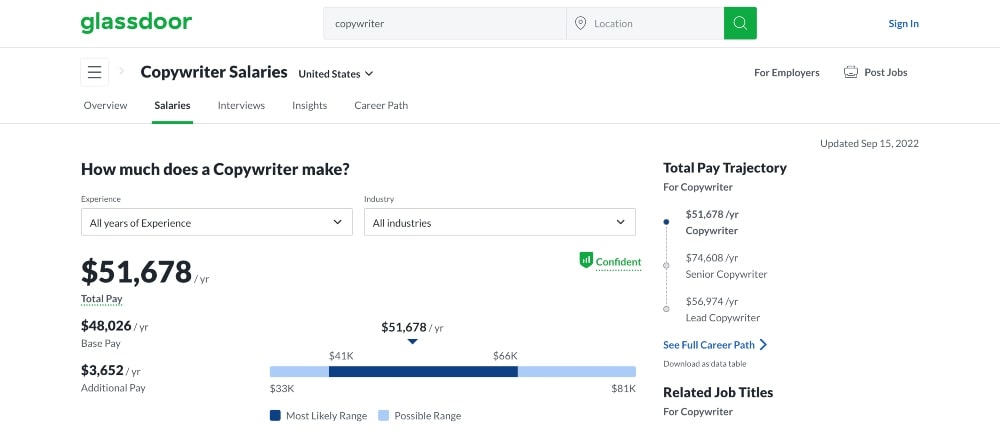
Of course, becoming a freelance copywriter isn’t your only option in the copywriting field. You may be able to land yourself a job working for a single employer doing in-house copywriting.
According to Builtin, for in-house copywriters, “The most common Copywriter salary in the US is between $70k – $80k.”
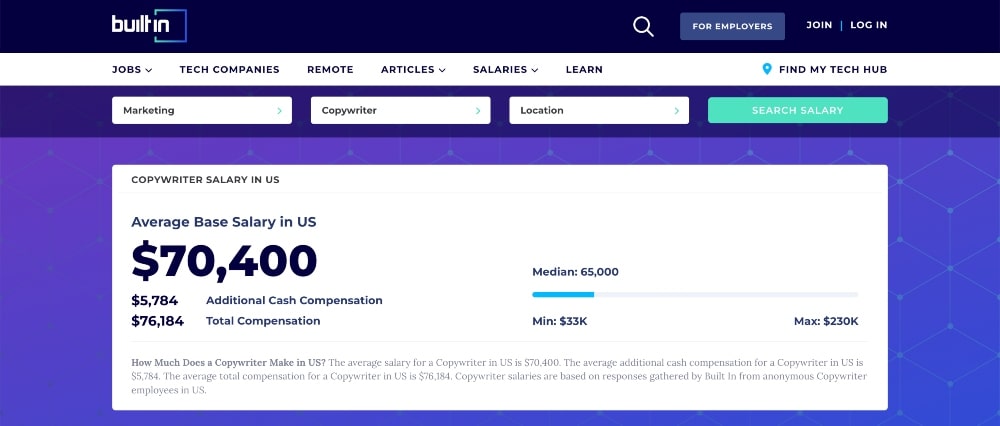
However, with a handful of solid clients and a few years of experience, a good freelance copywriter can blow past those salary figures and start bringing in more than $80,000 a year.
In order to reach those higher levels, you’ll need the skills as well as the ability to work in a competitive, high-pressure environment.
The hard truth is that copywriting isn’t easy, no matter your niche.
Think about it; there is a reason why the top copywriters in their field make good money.
A business owner isn’t going to blow $20,000 on a copywriter just to “give it a shot.”
If a business owner is paying you any amount for a copywriting job, they expect to earn back at least what they spent on the writing fees and then some.
Put another way, a positive return on investment is the key to getting more work from a client. If you can’t make sure that happens with your copywriting work, it’s unlikely a client will rehire you.
To perform at the level of some of the highest-paid copywriters in the industry – and we’re not even talking about the multi-million dollar money makers – you’ll need years of practice, training, and experience.
When you think about how to start as a copywriter, you need to ask yourself if you are ready for the type of pressure that being a professional copywriter, whether you work as a freelancer or in-house for a single employer, can bring.
To earn the big bucks, as they say, you’ll need to deliver. And, if you’re just getting your foot in the door, you’ll need proof that you are able to deliver.
Related: 20 Best Online Transcription Jobs – Work From Anywhere
Step-by-Step Guide to Become a Copywriter
Ready to dive into the world of copywriting? Here’s exactly how to become a copywriter and start getting paid for it.
1. Start Training and Build Your Copywriting Skills
If you don’t already have some copywriting skills, it’s time to learn how to be a copywriter with one of the resources we mentioned above, or something similar. Consider starting with a full course or a book.
2. Start Writing on Your Own Website
The only way to begin getting jobs is to have something for your portfolio that shows the world, or at least your prospective clients that you know what you’re doing.
What does this look like? For starters, it means starting your own website. There are multiple reasons you should have your own website.
Perhaps the most important benefit of having a website, is that it creates a great space to host your portfolio, showcase your writing, start sharing case studies, and more.
You don’t need a fancy website in the beginning – just a simple page that shows off your copywriting goodies.
We found a few awesome examples of copywriting websites if you’re looking for inspiration:
There are lots more you can find online as well. Simply look up “copywriting portfolio examples” in your favorite search engine, and we guarantee you will find plenty to peruse!
What Kind of Copy Should You Add to Your Website?
Here are some ideas:
— Affiliate copy: As you’re building your copywriting business, you likely will need to make money along the way. Affiliate marketing is a simple way to start making money from your words and get proof that you can convert readers into paying customers.
How do you do this?
Writing a blog post to persuade a reader to buy whatever product you’re talking about will earn you commissions when they buy said product with your affiliate link.
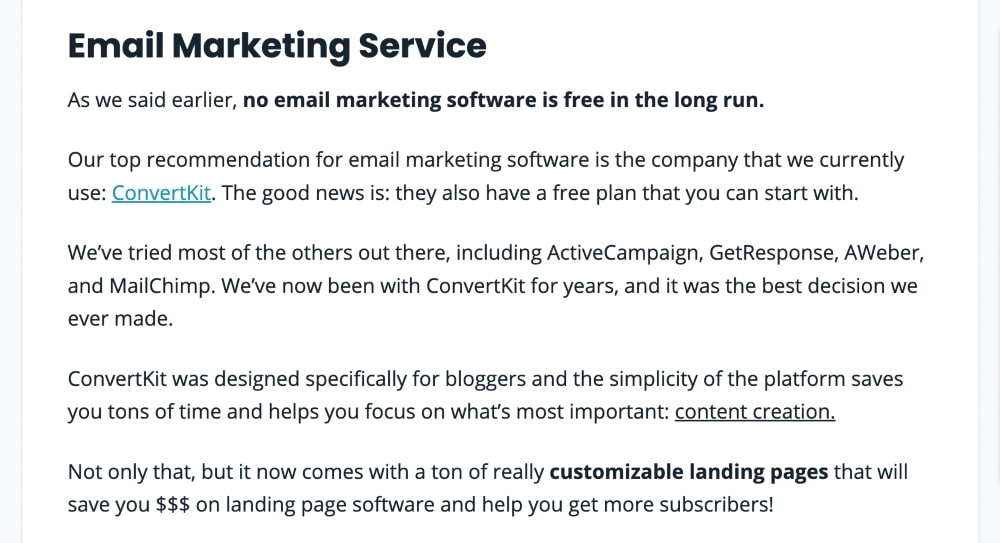
Then, you can write a case study about your affiliate marketing efforts that were directly related to your copywriting skills. Things to share in your case study include, but aren’t limited to:
- How many people read what you wrote
- Your conversion rate from reader to buyer
- What you can do for a company that hires you to write their copy
— Write a few pieces of copy for one or more of your favorite products: The practice will help you create copy on real products that are already on the shelf and share it in your portfolio.
If you go this route for getting clips for your portfolio, make sure it’s clear somewhere on the page that you are not affiliated with the company and that you were not paid for the write-up. Better to be safe than sorry as they say…
— Case studies and testimonials: Admittedly, it will take time before you can add this content to your website. You will need to have copy that is converting and/or some clients that are willing to sing your praises first.
3. Ask Someone to Hire You
In the beginning, this might mean writing for free for friends, local businesses, and even charities.
Local charities are a great place to start because you can volunteer, build your skills, and enjoy the warm fuzzy feeling that comes with giving back to your community.
Just make sure that anyone you complete unpaid work for is willing to let you use the experience in your portfolio. After all, the whole point of “paying your dues” is to get testimonials and social proof that you’re skilled at the job.
You can also start adding your name to job boards and freelance websites such as:
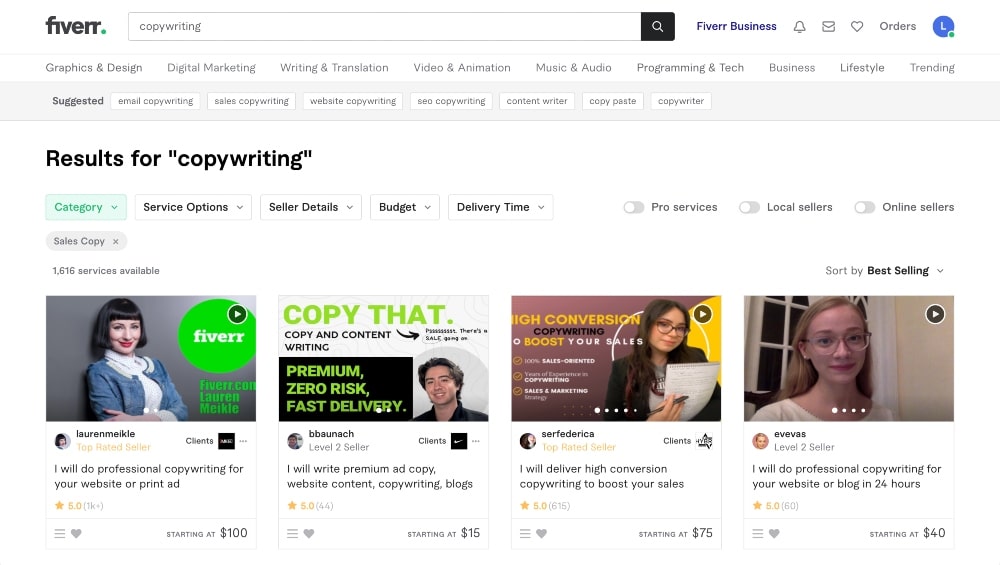
- Flexjobs
- Contena
- SolidGigs
- Problogger
- Clear Voice, and many others
The more places you can sign up and throw your hat in the proverbial ring, the better! Especially in the beginning!
4. Always Be Marketing Yourself
Every step of the way, keep marketing yourself and working on your skills.
What does marketing yourself look like?
- Adding your profile to websites like Upwork and Fiverr
- Consistently sending your resume to marketing agencies and PR firms
- Regularly applying to jobs on Flexjobs and similar remote working websites
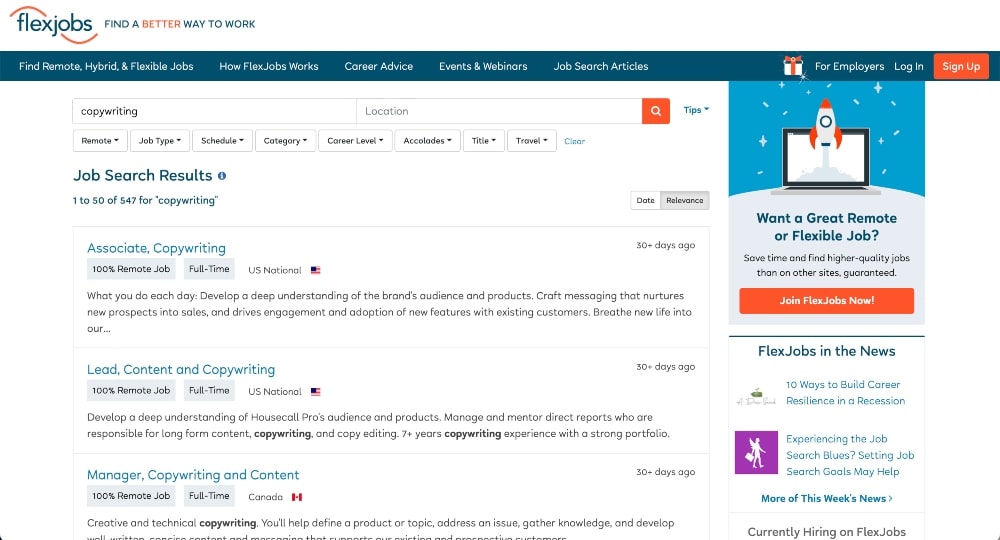
- Creating case studies on your website as social proof you know what you’re doing based on client data (when you are given permission to share this information)
- Updating your website with new portfolio pieces, testimonials, new copywriting posts, etc…
- Writing for other blogs and websites
- Appearing on podcasts as an expert copywriter
A few quick tips on networking in the copywriting field:
- Get out there and meet people. You can’t network if you don’t put yourself out there. So get out of your comfort zone and go to industry events, meetups, and conferences.
- Don’t be afraid to ask for help or advice when you meet someone new. Most people are happy to help if they can.
- Once you’ve met someone, make sure to create a process for keeping in touch with them. Whether it’s through social media, Linkedin, email, or good old-fashioned letter writing, staying in touch will help maintain the relationship.
5. Niche Down
At the beginning of your copywriting career, you should take every writing gig you can possibly get. Even the ones that aren’t paying the sexiest rates.
The more you can take on, the more you will learn things like:
- What you like
- What you don’t
- What you’re good at writing
- What you are less than stellar at writing, and more
Then, once you have a firm grasp on what you’re excelling at, you can niche down. Like way down.
By niching down and becoming a specialist, you can command higher rates as well. This is especially true if you’ve earned a track record for writing copy that converts.
It’s not enough to be a good copywriter. The proof is in the proverbial pudding as they say.
Your copy needs to translate into earned revenue for businesses. And, if you have social proof to back you up, it will be that much easier to get more work at the rate you want.
6. Improve Your Skills Along the Way
The more you can improve your skills, the faster you will be able to complete gigs and/or assignments.
For example, one thing you can improve on is your ability to research topics in depth. If you’re willing to put in the work, there are a few things you can do to improve this skill.
Start by reading as much as you can on the topic you’re researching. Whether it’s books, articles, or blog posts, the more information you consume, the better equipped you’ll be to write about it.
It also may be necessary to talk to experts on the subject matter. This will help you get a different perspective on the topic and allow you to ask specific questions that will improve your understanding.
Finally, don’t be afraid to experiment with different research methods. There’s no one right way to do things, so try out a few different approaches and see what works best for you.
By the way – this is why it’s helpful to niche down as well. The more of an expert you can become on a subject, the easier it will be to craft relatable content for it.
How to Scale Your Copywriting Job: From Side Hustle to Full-Time
Where do you go from here? Let this article be your roadmap for how to become a copywriter who earns a six-figure income.
The next step after getting schooled, writing all that glorious copy, marketing yourself, and getting more and more gigs is to either move into a full-time job or bona fide business owner with copywriters working for YOU!
While you are going to face a lot of rejection, at least at the beginning, challenge yourself to just start pitching your services. Add your name to job boards, start networking, and simply get yourself out there as much as you possibly can.
It could take some time to start getting work so keep working on your own website in the meantime. Keep working on your craft and don’t give up! With perseverance and a can-do attitude, you’ll rack up gigs in no time.
Are you ready to dive into the pool of possibilities? Just start! There’s nothing standing in your way. And, if no one will give you a chance, you can always keep building your own website and learning how to craft copy that converts making money on your own terms!
This blog was so helpful for someone like me who is a beginner in this field of copywriting.
Thank you! So glad you found it helpful!
I often deal with copywriters that are just starting their career. One of the most common mistake they make is what you describe in the beginning – they forget to sell. Or, they forget to apply CTA. And deadlines – oh, what a pain!